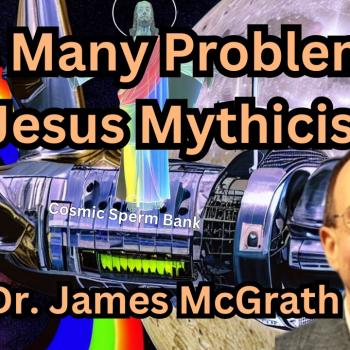Although I never followed the show, catching even a few snippets of Babylon 5 here and there have left me with a memory of the catchphrase that Babylon 5 was the “last, best hope” for peace.
And it failed.
Perhaps the same sort of phrase would fit what R. Joseph Hoffmann wrote today about Richard Carrier’s yet-to-be-published work attempting to make historical inquiry more rigorous by using Bayes theorem. Here’s a sample:
Debaters like Carrier have suggested that the critical methods developed for dealing with the Bible in the nineteenth and twentieth century are insufficiently rigorous. But that is simply not the case. In fact, the methods grew in tandem with evolving perceptions of what the character of the text actually was, how it was formed, and what its creators thought about the world. In the language of an older school of criticism, what its “life situation” was. They continue to evolve and to adapt in an organic way. Only if the sole question to be answered is whether the description of an event corresponds directly and generically to “what really happened” (if it were possible to answer that question, as it isn’t in many cases) would the modality of a forensic approach be useful, and its usefulness would still depend on prior questions…
Beyond the forensic approach, the question about the kind of literature the New Testament literature represents remains absolutely prior and absolutely crucial. As an example, the amount of material that can be removed into the category of “myth” (a great deal, from most of Genesis to all of Revelation) can never be determined by modal assessment of the truth properties of a text, since analytically myth is not amenable to modal analysis and only a wrong definition of myth as a kind of rhetorical lie or pre-scientific error–a definition that flies in the face of modern anthropology–would make such analysis possible. The forensic approach does itself a huge disservice by paying insufficient attention to the history of criticism, where the general mythological character of much of the material is almost taken for granted, and focusing instead on a discounted view of myth as non-factuality.
What is true of myth, moreover, is true of the other “forms” (literary and historical genres) that exist within the Bible and the New Testament especially. So much of the Jesus story is myth, in the sense of μυθογραφία (writing of a fabulous story), that I have no objection to the phrase “the Jesus Myth.” –But a great deal to object to in the sentence “Jesus ‘was’ a myth,” implying absolute non-historicity and a method designed simply to document his irreality.
Click through to read the rest.
Richard Carrier also posted on his blog today (and via John Loftus I learned about a recorded interview with him).
Richard Carrier is the one historian with a PhD who espouses mythicism. He is mythicism’s “last, best hope.” If mythicism loses him, trying to maintain any semblance of scholarly credibility will be even harder than it already is. I appreciated Carrier’s work on the New Testament prior to espousing mythicism (since which time he has published very little relevant to this area), and so I keep hoping that he’ll return to the mainstream academic fold. But even if he doesn’t, he is exemplary among mythicists in acknowledging that scholars investigating the historical Jesus are using tools also widely used elsewhere in mainstream historical study (even though he is critical of them). And if his attempt to make historical tools more rigorous, and in so doing provide a basis for mythicism, ends up being a failure, then it is safe to say that mythicism will go from being mostly dead (to allude to The Princess Bride) to all dead.
Listening to the interview, however, it sounds to me like even if Carrier’s restatement or invigorating of historical method in Bayesian terms proves successful and gainst acceptance, mythicism as we know it from authors like Earl Doherty and Robert M. Price (to say nothing of Dorothy M. Murdock) will be exposed as weak and implausible by the principles of evidence and argumentation he proposes.












